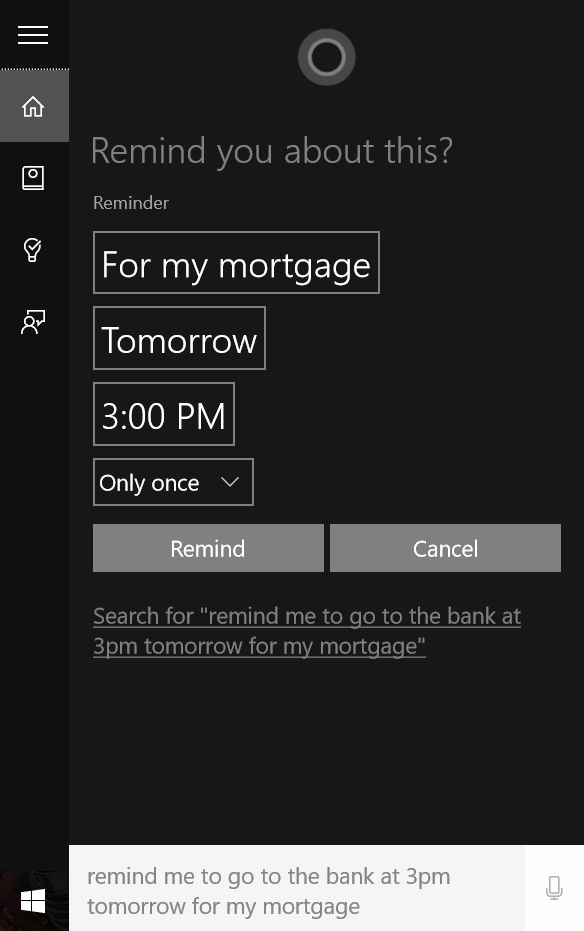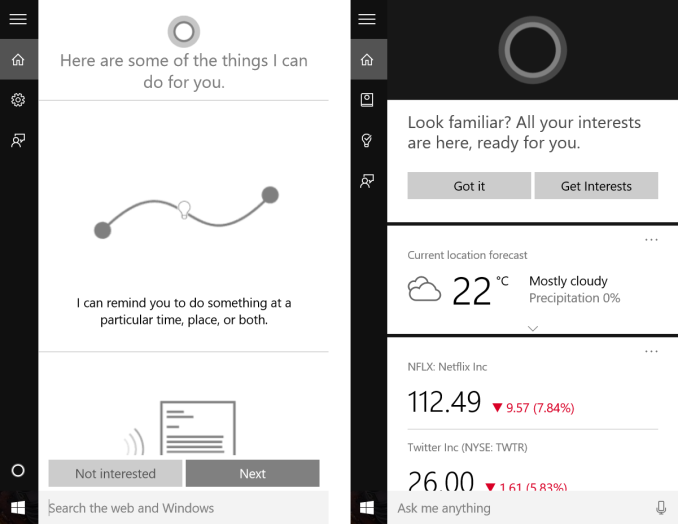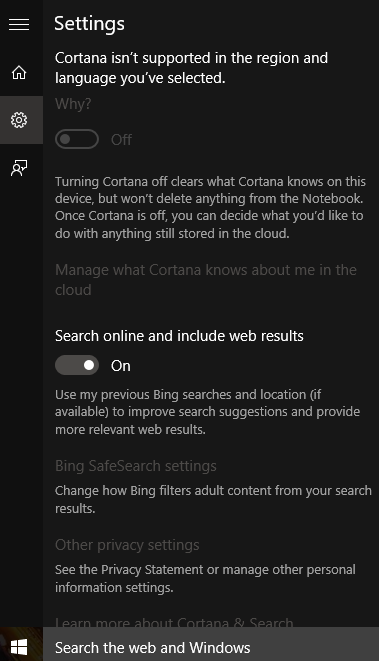The Windows 10 Review: The Old & New Face of Windows
by Brett Howse on August 25, 2015 8:00 AM EST- Posted in
- Operating Systems
- Microsoft
- Windows 10
Changing the Way You Interact With Your PC: Meet Cortana
Digital personal assistants have graced our smartphones for a couple of years now. Traditionally, computers reacted to specific commands. Double click to open calendar. Select tomorrow. Right click. New. Reminder. Meeting about mortgage. At the bank. 3pm. Save. It’s the way it has always been, because as fast as computers are at certain tasks, they don’t speak any languages other than the commands that they know. Google Now, Siri, and Cortana on Windows Phone have allowed us a glimpse at natural language input on mobile devices, Microsoft is extending that functionality to all Windows 10 PCs with Cortana now available on the PC as well..
“Hey Cortana, remind me to go to the bank at 3pm tomorrow for my mortgage”
There is nothing you can do with Cortana that you could not have done manually yourself, but the goal of these digital assistants is to make certain tasks easier. At the moment, Cortana is certainly not an AI being, and as such, is still limited in what commands are possible. Anything that falls outside of the features of Cortana end up in a web search. For a full list of commands, ask Cortana for help and a list will appear. Cortana is able to do contextual searches and replies too, and can respond to follow up questions without having to restate the original question again.
You can use Cortana to search for what music is playing, track your flights, set appointments, give directions, and more. Over time, this will also expand to offer more functionality.
Cortana will of course respond to speech inputs, and can even be set to always be listening for Hey Cortana much like you see on smartphones these days, but it is also just as capable with text based input, and it is smart enough to know that if you talk to it, it can reply in audio, but if you type something in, it will reply with a text response.
Sitting at your desktop, you may be thinking that you don’t need or want this on your PC, since you have it on your phone. If you are someone who uses your PC for any amount of time, being able to type in quick reminders or check calendar appointments can be a great feature. Cortana is also proactive, and knows your appointments and can remind you that you need to leave. Once again there is nothing new here, since smartphones already have this functionality, but for those of us who spend a lot of time at a PC during a day, it is very nice to have this.
I think one of the untapped potentials of Cortana will evolve over time. Microsoft has been pushing to add Cortana support to iOS and Android, and while you may feel that effort is in vain because they already have their own integrated personal assistants, Cortana will be the link between any of your devices. You can set reminders on your PC but if you are out at the gas station with your Android phone, you’ll get notified. Cortana also supports geo-fencing, so you can tell it to remind you to do something the next time you are at a location, and that will work from the desktop to the phone as well, no matter what phone you use.
The one major issue with Cortana at the moment is just how limited it’s deployment is. Microsoft is tuning Cortana to each region where Windows is available, and as such it is only available in seven countries right now, with the U.S., UK, China, France, Italy, Germany and Spain being available at launch. More countries will be coming online in the next couple of months. By tuning the experience to each location, they can ensure that the experience fits in with the culture which varies so greatly across the globe.
I have only had a small glimpse of Cortana on the desktop, although I have used it quite a bit on my phone, because being from Canada I am on the list of countries waiting. But that small glimpse, as well as the integration of Cortana with the rest of the system, shows that Cortana might be one of the most important additions to Windows in this release.













293 Comments
View All Comments
prophet001 - Tuesday, August 25, 2015 - link
The spyware aspect of this OS bothers me. I'll be using Windows 7 until this is reconsidered.Michael Bay - Tuesday, August 25, 2015 - link
So, the same spyware.prophet001 - Tuesday, August 25, 2015 - link
Windows 7 doesn't even begin to approach this level of intrusion.Michael Bay - Tuesday, August 25, 2015 - link
As long as you believe that.wishgranter - Tuesday, August 25, 2015 - link
The Windows 10 EULA and Microsoft's Privacy Statement declare that Microsoft will access and use the content of people's emails and other files, such as documents uploaded to One Drive, according to Microsoft's discretion. "Share with our partners" also includes law enforcement, wherever Microsoft deems required. And I think Microsoft cannot ignore any instance which they feel should be forwarded to law enforcement without making themselves complicit in any potential criminal activity.Windows 10's all-your-contents-are-belongs-to-us policy is also a widening of the backdoor which law enforcement asks OS manufacturer to build into their systems.
Basically, Microsoft's Windows 10 EULA claims that all files used in Windows 10 may be accessed, searched, and contents utilized by Microsoft, with Microsoft exercizing sole discretion over what it will access, and how it will be used.
I think all businesses, content creators, and even nations should be dismayed at this. It looks like Russia already is concerned with Windows 10's always-on espionage against its users:
http://www.rt.com/politics/312172-windo ... ent-stirs/
If people will recall, Microsoft was previously found to be snooping in people's Outlook emails, and this discovery caused a furor among people, leading to Microsoft saying they would not do this anymore:
http://www.wired.com/2014/03/microsoft_vigilante/1
http://www.theverge.com/2014/3/20/55314 ... l-policies2
But now, Microsoft has made it a guaranteed policy of Windows 10 that they will always do this:
https://www.microsoft.com/en-gb/privacy ... fault.aspx
"Content. We collect content of your files and communications when necessary to provide you with the services you use. This includes: the content of your documents, photos, music or video you upload to a Microsoft service such as OneDrive. It also includes the content of your communications sent or received using Microsoft services, such as the:
- subject line and body of an email,
- text or other content of an instant message,
- audio and video recording of a video message, and
- audio recording and transcript of a voice message you receive or a text message you dictate."
Shouldn't there be a much bigger furor over the discretionless snooping of Windows 10, which includes all Outlook emails, than there was over just Outlook on its own?
Are people OK with their PCs contents no longer being their sole domain and in their privacy, but instead being fully open to Microsoft?
I'm not. I'll be sticking with Windows 7 for now.
Windows 10's motto: Your System is not Your Own
xenol - Tuesday, August 25, 2015 - link
You're reading the TP EULA. The actual Windows 10 EULA is at http://www.microsoft.com/en-us/Useterms/Retail/Win... , which defers the privacy stuff to Microsoft's privacy statement ( https://www.microsoft.com/en-us/privacystatement/ )Which says none or few of the things in the TP EULA (the only one I found in common is they may look at anything you upload to OneDrive, which you can disable on Windows 10 anyway)
Grooveriding - Tuesday, August 25, 2015 - link
Really unfortunate how far Microsoft went with privacy invasion and data trolling with Win 10. Fortunately you can disable what appears to be all of it with options, registry tweaks and disabling services.I would also recommend running a draconian firewall such as Tinywall that blocks all internet traffic and you have to allow applications on a case by case basis. As well as editing your hosts file to block all traffic back to Microsoft's data collection servers. As well, never use the OS with an MS account, just use a local account.
Pretty outrageous MS does not offer an option to disable everything without having to resort to these measures.
hansmuff - Tuesday, August 25, 2015 - link
The "sharing with law enforcement" is automatic for any data Microsoft has. If you're on 7 and use OneDrive, well there you go.Regarding the recording of voice data, that's a given with all of them. Siri, Google, now MS all use online services to improve detection and of course otherwise use that data. And they all send your recorded voice in some form or shape to their servers.
I can see how you'd tie it to Windows 10 because that centralizes a lot of those "new generation" of services that are in the cloud. But those services exist with or without Windows 10. I think it's wiser to educate people about what "the cloud" implies, which is exactly what you say; people do not have control over the data they store.
It's a cloud issue, and the cloud has provided the perfect vehicle for the likes of Apple, Google and Microsoft to take what they want. This goes for your PC, phone, tablet, everything.
Notmyusualid - Tuesday, August 25, 2015 - link
None of my phones or PCs send anything to the cloud.It is called privacy common sense.
Matts8 - Tuesday, August 25, 2015 - link
What phone do you have?